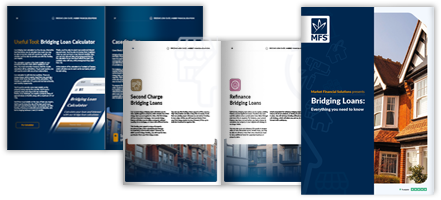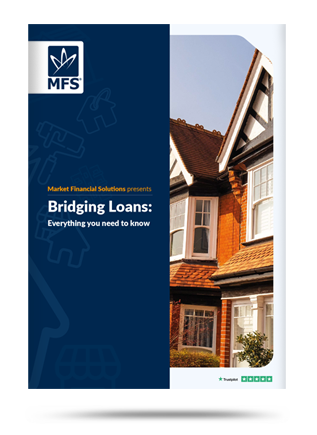Disclaimer
Market Financial Solutions are a bridging loan and buy-to-let mortgage provider, not financial advisors. Therefore, Investors are encouraged to seek professional advice. The information in this content is correct at time of writing.

The concept of fixing and flipping houses is easy enough to understand. An investor purchases a property, which is probably debilitated, fixes it up, and then sells it on for a higher price.
But, in practice, things can go wrong. The renovation could end up taking longer than expected. Refurbishment costs may rise unexpectedly. Buyers may pull out at the last moment.
With these types of challenges looming, property investors will likely want to make sure the finance at their disposal is flexible enough to keep up with the market. Fortunately, fix and flip bridge loans are primed for this, and there are many ways to use bridging loans to flip property.
Using bridging loans to flip property – what options are there?
There are many types of bridging loans that could be utilised for a property flip. To start with, property investors can turn to specialist finance for the initial acquisition of a property.
There are the standard, obvious options. Our residential bridging loans can be used to purchase a range of residential assets, from terraced houses through to student housing. There are also large loans of up to £50m available for more substantial purchases.
But, we also have auction finance at the ready. This funding is used for properties specifically found at auction, where purchases often need to be wrapped up within 28 days.
These may prove especially useful as discounted, run down properties in need of some TLC often turn up at auction houses. Business bridging loans, and bespoke finance for limited companies, are also available for organisations that may want to make flipping properties their ongoing strategy.
1. Fixing
Once an investor has secured their asset, they can then focus on the “fixing” portion of their plan. Again, fix and – flip – bridge loans can help.
Our permitted & light development bridging loans can be used for a range of refurbishment, renovation, or conversion plans. This includes bringing a home up to code so it can accommodate tenants, refurbishing a property to increase its value, or renovating a damaged home to completely modernise it.
Should an investor’s complicated financial situation be preventing them from moving forward with their plans, refinancing and/or second charge funding can also be utilised. By helping clean up one’s finances, they can help clear the path for using a bridging loan to flip houses.

2. Flipping
Investors don’t need to solely focus on the residential side of things either. Conversion finance could allow investors to fix a home, then flip it to an entirely new market. Perhaps there’s an empty office in a part of a town which has been abandoned by local businesses. Turning this office into new, attractive flats could prove fruitful.
Also, while the flipping side of things is usually concerned with selling a property, finding renters could also be applicable. The flip could be securing income from eager tenants. Here, our bespoke BTL mortgages can provide landlords with bridging like speed and flexibility.
Why should investors care about using bridging loans to flip property?
Put simply, there may be plenty of incentives to act upon this year. Some landlords may be tempted to sell up over the coming months as new capital gains tax changes[1] take hold.
The market may soon be flooded with rental properties. And when supply jumps, prices may drop. Investors may then purchase relatively affordable rental properties, fix them up, and sell them for a profit or find higher paying tenants.
If new CGT rates don’t tempt landlords to sell though, other legislative changes might. The potential scrapping of section 21 notices[2], or new Airbnb rules[3] could force many BTL investors to cut their portfolios.
But even if we don’t see a rise in new properties coming to market, there are still plenty of existing homes that could be flipped. Currently, there’s believed to be around 1.5 million homes left vacant in the UK[4]. With ongoing mismatches between supply and demand, bringing unused spaces to the masses will likely be greatly appreciated.
And of course, it’s not just homes that are underutilised. Many commercial properties, – from offices[5] to retail outlets[6] – remain empty after the pandemic. Wasted space, and wasted opportunity.
Not to mention, there could be a small window of opportunity in 2024. House prices may fall 2% this year, according to the Office of Budget Responsibility’s Spring Budget forecast[7].
But, according to several consultancies and property firms[8], house prices are set to rise again from 2025. Time could be running out to secure property at a discount.
Taking the opportunity
No matter how investors plan to use a bridging loan to flip a property, we’ll be there to provide funding that’s tailored to their circumstances. What’s more, we have a range of funding options that can fit in with any number of investment strategies.
Regardless of whether investors plan to expand into new markets with HMOs, or take advantage of a holiday let hotspot, we’ll be able to help.
The Complete Guide to
Bridging Loans
Everything you need to know
- Different bridging types
- Useful tools
- Apply them in real life
- Market insights & more
[1] https://www.cityam.com/spring-budget-2024-renters-worry-as-hunt-coaxes-landlords-to-sell-with-capital-gains-tax-cut/
[2] https://www.landlordtoday.co.uk/breaking-news/2024/3/scrapping-section-21-is-the-biggest-rental-headache–poll
[3] https://www.independent.co.uk/news/uk/home-news/airbnb-planning-permission-renting-cornwall-b2498287.html
[4] https://www.bigissue.com/news/housing/uk-housing-crisis-sin-tax-empty-homes-smf/
[5] https://www.telegraph.co.uk/business/2023/11/04/britain-commercial-property-market-downturn/
[6] https://bmmagazine.co.uk/opinion/will-our-high-streets-crumble-under-the-pressure-of-empty-properties/
[7] https://www.mortgagestrategy.co.uk/news/house-prices-will-fall-2-in-2024-obr/
[8] https://www.thetimes.co.uk/money-mentor/buying-home/will-house-prices-fall-uk





